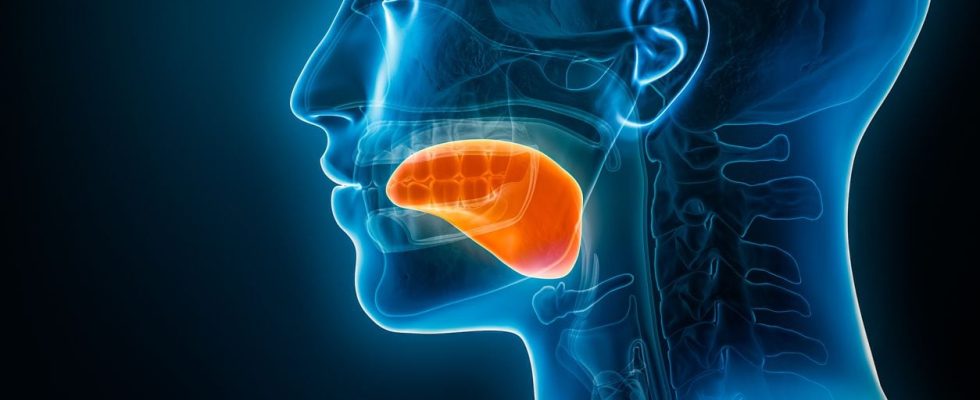It is a misunderstood organ, often forgotten. However, where would we be without our language? It is present in all the major stages of development. Its appearance in the mix of cells that forms and deforms at the beginning of pregnancy accompanies the transition from embryo to fetus. Its development follows that of the child, from his first experiences of taste, touch, then speech. With specialists, only young parents confronted with a poorly positioned or misused language in their child realize how essential and rich it is: “The language is an organ that we rarely think about and yet has many unsuspected roles”, underlines Cyril Vidal, dental surgeon member of No Fake Med, a collective which monitors therapeutic abuses.
The tongue is in the hand, with its sensors of hot, cold, texture and its ability to grip food, but also in the nose: it helps detect the odors that emerge from food when chewing. It contains 17 muscles, among the most powerful in the human body although sometimes a little rebellious: the more we concentrate on controlling them, the less we achieve our goals. So many attributes that make it one of the child’s main interfaces with their world.
The suction function, one of the very first in the human body, operational very early in the mother’s womb, allows the baby to eat when he cannot yet chew. Then comes swallowing – we swallow 2,000 times a day – then the development of motor skills. The baby then goes from babbling, these test noises that he pronounces after having passed the stage of all-crying, then to speech.
Sometimes, the place for the tongue is difficult to find, jostled by changes in the teeth and palate during growth. Incorrect positioning can cause eating disorders, shift teeth, cause sleep apnea or cause lisping and hissing. “We then teach the child to be aware of their movements and to strengthen their tongue using oral or vocal exercises,” explains Sophie Joly Froment, speech therapist and contributor to the magazine. Hello Orthowhich devotes numerous articles to the language.
Close ties with the hands
In recent years, many researchers have become interested in this organ, and in particular in the surprising relationship it has with the hand. A strong bond unites them, from pregnancy onwards. At the end of the 3rd month, when the forearm passes in front of the mouth, the lips open on their own and the tongue sticks out. This is the Hooker reflex, well known to pediatricians because it is considered one of the baby’s first movements and therefore the transition from embryo to fetus.
Researchers at the University of Toronto asked volunteers to make hand movements while speaking. Their reaction times were consistently slower when they uttered certain sounds. The study, published in November 2023 in the scientific journal Psychological Research thus tends to show that tongue movements, responsible for the execution of syllables, interfere with our ability to grasp objects.
If these links remain poorly understood for the moment, a study which has not yet been published, conducted on mice by researchers at Duke and Saint-Louis universities, shows that specific neurons are responsible for coordination between the hand and tongue, essential for feeding For example. An ability, which became necessary during evolution during the transition from the aquatic environment to the terrestrial environment.
In her office in Ile-de-France, Catherine Thibault, speech therapist and author of Language. The private life of a very discreet organ (1)tries to restore to his patients the taste for this organ, too long despised, subject to contradictory injunctions: one should not have it in one’s pocket or hang up, not lose it, do not forget anything on its end, the turn it seven times in your mouth, give it to the cat when you don’t know, avoid swallowing it, pulling it…
Language, too often mistreated
In 40 years of practice, the specialist has seen fashions come and go. The trend is for pacifiers, she says, as big as possible, to do like the influencers on Instagram. Given at random, often at the same time as a screen to silence the screams, it can cause problems, even if it is recognized that sucking helps the child to relax and reassure himself. “The risk is having an immature tongue and a loose mouth, so you have to try to get rid of it, between 2 and 3 years old.”
Another harmful phenomenon: cutting the frenulum that allows you to keep your tongue in your mouth, with scissors or a laser. An act on the rise in particular in the USA and carried by the caregivers themselves, midwives, osteopaths, even pediatricians. “If brakes that are too small can be disabling, these manifestations are very rare,” recalls dentist Cyril Vidal. In April 2022, theAcademy of Medicine called for doing less.
(1) To be published on January 18. The Archipelago, 208 p., 20 euros.
.
